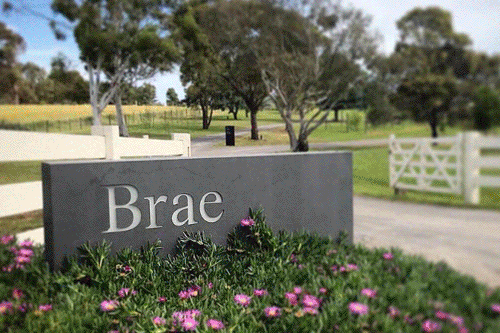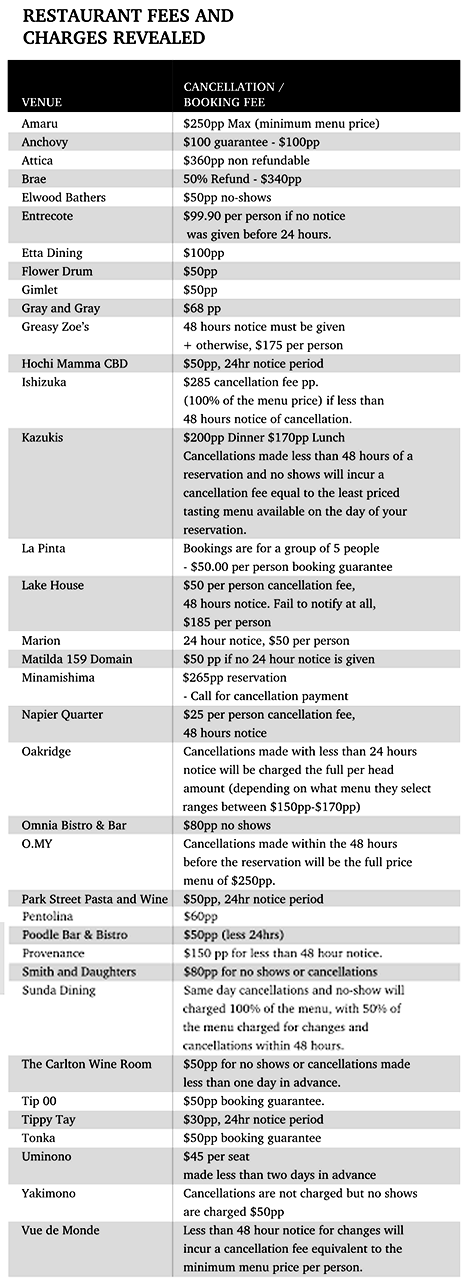Minimum spend and large cancellation fees could keep customers eating at home while restaurants suffer with rising costs

While some restaurants are still struggling to regain their mojo in a post covid world, the decision to charge large cancellation fees and introduce minimum spend is an interesting one that could keep customers away.
One of Victoria’s best restaurants is charging diners $265 each for cancellation with less than a full week’s notice.
It’s a catch-22 situation: restaurants base their resourcing on diner numbers and short notice cancellations and no-shows will have an impact on the bottom line as restaurants have to pay staff and food costs. Yet, exorbitant fees could keep customers away.
Brae restaurant in Birregurra on the Cape Otway Rd, publicises its cancellation policy on its website and reiterates it on its social media platforms. Brae does offer leeway for Covid ravaged diners.
Brae, however, will charge half the advanced $340 cost of dinner and the added $190 for matched wines if customers cancel within a seven-day period.
That’s a $265 bill for nothing. If customers do cancel with seven days’ notice or more, they are slugged a $25 administration fee.
Brae said its cancellation policy was stated “very clearly on the reservations page of our website, again within the booking process itself and in confirmation emails. We have no reason to hide this necessary policy from anyone”.
Rosetta at Crown Melbourne has also introduced prepayment. The former Neil Perry run restaurant charges $100 per person and $50 per person fee for cancellations within 24 hours.
Consumer Affairs Victoria says any extra charges should be agreed to in writing and come with a detailed explanation of the cancellation fee.

Open Table offers some protection for restaurants and customers.
“OpenTable can offer a layer of protection against this; our platform allows restaurants to hold a deposit for reservations, which will be charged in the case of a no-show or late cancellation, and that acts as a deterrent to this behaviour,” Drew Bowering, senior director at Open Table said.
Open Table does have some good news for restaurants with data showing now shows have decreased over the past three years, from 2.7 per cent in 2019 to 1.9 per cent in 2022.
“No-shows can be extremely disruptive — we do have a no-show policy, whereby if a diner fails to arrive at a scheduled booking four times over a 12-month period, their OpenTable account will be deactivated.”
A major reason for the introduction of fees is the rising costs of goods.
“Restaurants are a combination of hard work, dedication and passion. But at the end of it all they are businesses that have employees to look after and bills to pay,” Omnia Bar and Bistro culinary director Stephen Nairn said.
“Not every single restaurant has a waiting list seven days a week for lunch and dinner with 50 names on it.
“When someone cancels on the day, or just before, it is very difficult for the restaurant to resell the table,” he said.
Degustation menus for fine dine restaurants make the issue even more problematic.
“The chance of a walk-in table, prepared to part with $300 per head on a whim, is very slim,” Nairn said.
“So I can completely understand these restaurants adopting a 48-hour policy and full cost of the menu (fees).”
“The restaurant will have prepared the food and the service team will already be on the floor.
“Team members having their shifts cut short creates a difficult problem for both operator and employee. Then the produce is purchased and prepared thinking that the restaurant will serve 60 seats. The chef never wants to purchase produce that is not required, as it’s not just the dollar value but the time and labour to prepare,” Mr Nairn said.
Irit Jackson, 2nd August 2022







